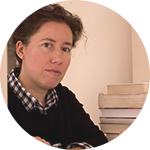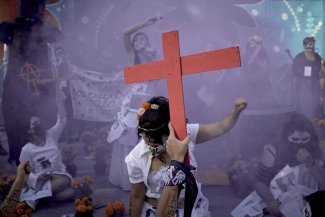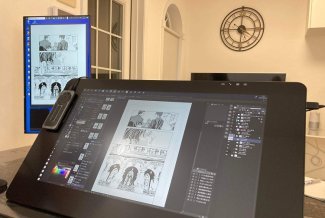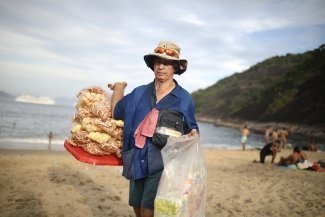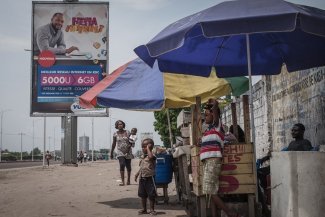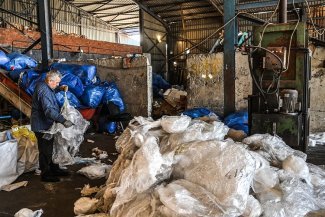Ali Zeddini, during International Civil Society Week 2016, held by CIVICUS IN Bogotá.
Ali Zeddini, vice president of the Tunisian Human Rights League, an organisation that forms part of the National Dialogue Quartet of Tunisia, awarded the Nobel Peace Prize in 2015, considers civil society to be “the cornerstone of any modern democracy (when kept free from political manipulation), the conscience of the people, and a vehicle of change”.
In an interview with Equal Times, Zeddini joins the many critics of the EU’s management of the refugee crisis. He also warns of the authoritarian drift of the Turkish president, Recep Tayyip Erdogan, the potentially catastrophic repercussions of renewed international intervention in Libya, and the fragility of the transition in his country, a process beset with challenges as vast as unemployment, terrorism and instability in Libya.
Tunisia, one of the countries to experience the Arab Spring of 2011, is the only Arab country still moving forward with its transition. In your view, what stage has been reached in that process?
We have taken a major step forward, that is, the political transition. Elections have been held and we now have solid institutions such as the parliament, the presidency of the Republic and constitutional bodies. But the main problem Tunisia is now facing is the socioeconomic situation. And terrorism.
People took to the streets with slogans calling for economic and social rights, not political rights alone. We must not lose sight of the fact that we have 800,000 young people out of work, including 300,000 with higher education diplomas, in a country of 11 million people. The rate of unemployment is over 15 per cent, and in some regions (inland Tunisia, the cradle of the revolution), the figure is even higher.
Without measures to combat exclusion, without concrete measures to develop the inland regions of Tunisia, everything is still hanging in the balance.
You mentioned that together with the socioeconomic issue, terrorism is another key problem in Tunisia. According to various studies, Tunisia is the world’s leading exporter of foreign fighters, especially to Syria and Iraq. What is your reading of this situation?
A number of significant factors, which emerged following the Revolution, should be taken into account. First of all, the Salafis (being held in jail) were released.
Secondly, and even more importantly, Tunisia saw the arrival of fighters (not only Tunisian) from Afghanistan and the Balkans, seeking to take advantage of the state’s weakness following Ben Ali’s departure.
Then there was also the return of the so-called “moderate” Islamists, encouraged by the United States, in particular.
The supposedly “moderate Islamists” that came to power following the first elections gave free reign to the extremists. And it is, precisely, this extremist wing that has encouraged young people to go to Syria, to the jihad. Not to mention the massive financial influence of the Gulf countries, supposedly aimed at combatting the Syrian regime.
How is the problem being tackled, especially in the south of the country or in the border areas?
Extremists can be found all over Tunisia, although it is true that there are many leaders in certain regions, such as Sidi Bouzid.
The issue of terrorism is, indeed, the subject of wide debate in Tunisia: among civil society, the government and the various stakeholders.
What we would like to see is a multidimensional plan to combat terrorism, starting with the fight against exclusion, the integration and development of the most deprived regions, the reform of the education system, and the development of culture and the arts, as well as the security aspect. The security aspect is just one dimension (not the only one, or the main one). This should be also be covered the media, and every aspect should be addressed with absolute and strict respect for human rights.
There are two categories to be taken into consideration: the first includes those with blood on their hands, who are in jail in Syria. The government wants them to be extradited to Tunisia and to be brought before the Tunisian justice system.
Those in the second category, the others, represent a very difficult problem. They are, in principle, less dangerous and there is still a chance they could be recovered. They have to be registered, of course, but, above all, we need to try to reintegrate them.
Another major issue is the fact that there are also cells lying dormant (which are not being monitored and that received funding during the rule of the moderate Islamist government). This is also a very dangerous problem.
As regards refugees, in 2011, Tunisia received around a million Libyan refugees (following the intervention of the international coalition that overthrew Gaddafi). What is your position regarding (potentially) renewed military intervention bringing another wave of refugees from the neighbouring country?
Allow me to correct you. We received two million.
And first and foremost, there is a Tunisian position, held by the state, by the people and by civil society, that is against military intervention in Libya. There should be no military intervention. Respect for the sovereignty of peoples is a matter of principle.
Aside from the refugee issue, which I will deal with afterwards, we are also confronted with the problem of weapons. There is an incalculable amount of weapons in Libya, together with total complicity between the terrorists and the smugglers taking arms across the border and hiding them in Tunisia. In the context of a war, we believe this arms trafficking will increase, despite the 120 km trench we have dug in the Sahara desert, between Tunisia and Libya.
To give you an idea of the gravity of the situation, a few months ago, IS attempted to take over the city of Ben Gardane (on the border with Libya), to establish a caliphate. They failed miserably, thanks to the response of the security forces, the military and the local people.
Returning to your question. Tunisia is a country of 11 million people. In 2011, we took in over two million Libyans. A million of them have stayed here until now as refugees, and we have said nothing. We have shared our bread with them, our children’s milk, without any aid from anywhere, not the United Nations, Europe or any other party. It happened in a very natural way, without any international drama or media buzz.
Meanwhile, Europe, which has experienced a world war, Europe, which is also partly responsible (France, for example), has dealt with the problem of the Syrians, the refugee issue, in a truly shameful manner.
Do you think the possibility of extreme right parties coming to power in Europe could make the situation even worse for refugees?
It could get worse, judging by what is happening now. That’s why a negotiated settlement and a lasting peace should be encouraged in Syria, so that people are able to return to or stay in their country.
But there is no easy solution, because the Syrian problem is no longer purely Syrian. Shortly after it (the war) started, it became a battleground for regional forces and world powers, a testing ground for new weapons, etc.
What is your view of Erdogan’s policies, particularly in the area of human rights and freedom of expression in Turkey?
The situation in Turkey and what Erdogan is doing is dangerous. And unfortunately for everyone, he has been democratically elected.
He is trying to exploit the Kurdish issue, using it as a pretext for stifling freedoms, to roll back the advances in terms of rights and, in particular, the modernising reforms of the Turkish secular state.
He is using Syrian refugees as a bargaining chip in negotiations with the Europeans, and to score political points.
With regard to terrorism and the national laws passed to tackle this problem, how do you see the immediate future in terms of the right to assemble, the right to demonstrate, etc., around the world?
We are going through a period of constraint on freedoms. You just have to look at France, a country that inherited the French Revolution, a country of principles, of absolute freedoms, that has tried to use the machinations of the far right.
Let us not forget that François Hollande initiated proceedings to permit the withdrawal of nationality and to curtail freedoms (following the Paris attacks). If it were not for civil society, or a minister like Christiane Taubira, the green light would have been given for initiatives that are more in keeping with the extreme right.
Allow me a relevant aside here, regarding the issue of double standards: we speak of terrorism but we turn a blind eye to the state terrorism Israel exerts on Palestinians, and the war crimes of Benjamin Netanyahu, who is the extreme right of Israel, and its army.
What do you see as civil society’s role (the central theme of the CIVICUS conference) in all the issues we have discussed?
Civil society is the conscience of the people, the guarantor of values and principles. An independent, autonomous civil society, a civil society that is free from political manipulation, that is a true guardian of its values and principles, this civil society fills me with great hope for the future.
Finally, do you think the Tunisian model could be exported to other countries of the region?
No. We can always take inspiration from the experiences of others, but we cannot export them, because every country has its own realities and specificities. It is essential that we be creative, free of taboos, free spirited, and, above all, that we believe, believe, believe in dialogue. Crises can be overcome through dialogue, a dialogue in which concessions are made on both sides, otherwise it is a dialogue of the deaf.
Note
This interview was made possible by CIVICUS, organiser of the2016 International Civil Society Week. The conference was held under the slogan “Active Citizens, Accountable Actions” in Bogotá (Colombia) at the end of April. Over 30 events (focussing on peace, inclusion, enabling environment and participation) were hosted by leading civil society organisations during the conference.
This article has been translated from Spanish.



